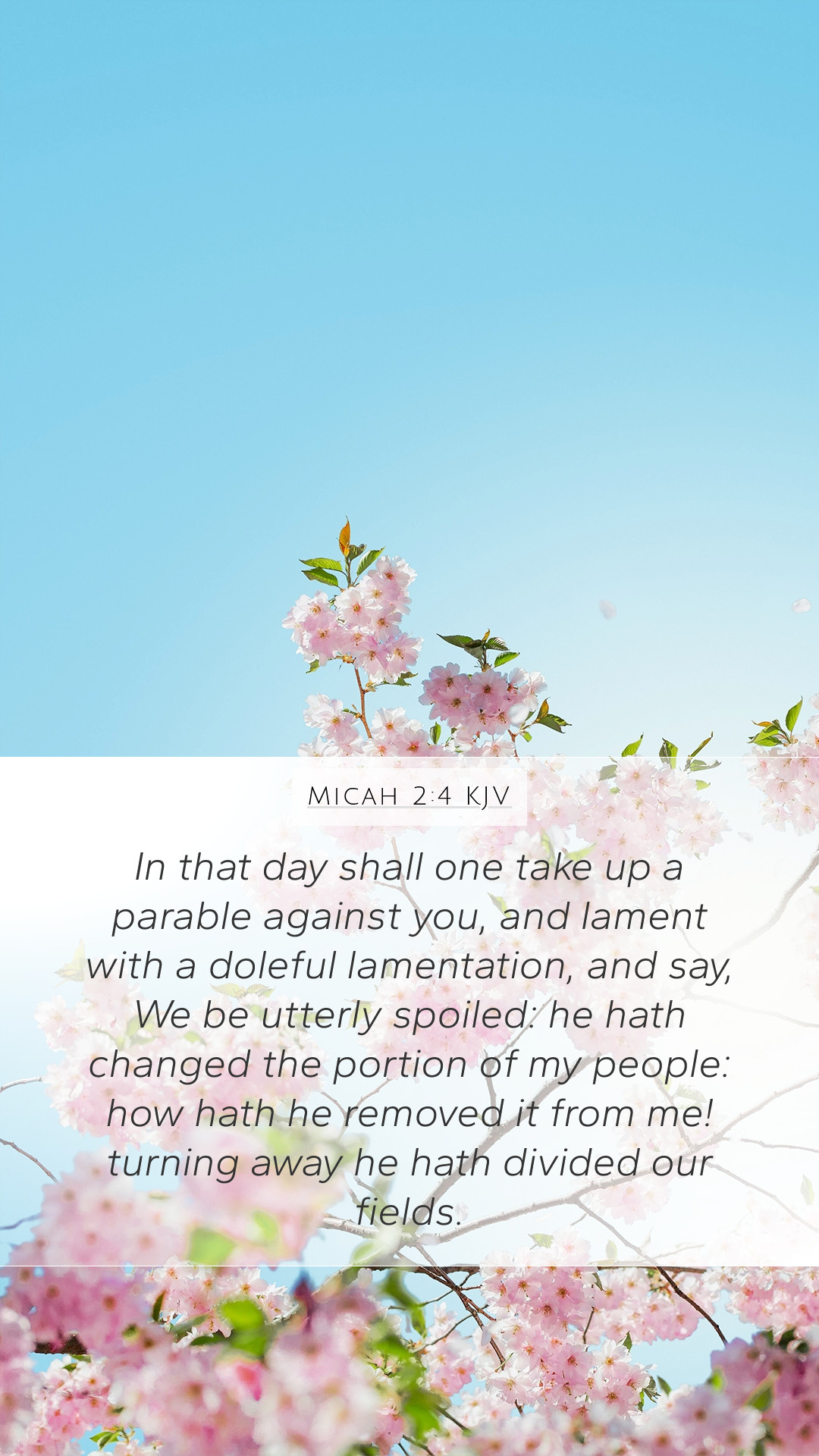Old Testament
Genesis Exodus Leviticus Numbers Deuteronomy Joshua Judges Ruth 1 Samuel 2 Samuel 1 Kings 2 Kings 1 Chronicles 2 Chronicles Ezra Nehemiah Esther Job Psalms Proverbs Ecclesiastes Song of Solomon Isaiah Jeremiah Lamentations Ezekiel Daniel Hosea Joel Amos Obadiah Jonah Micah Nahum Habakkuk Zephaniah Haggai Zechariah MalachiMicah 2:4 Meaning
What is the meaning of Micah 2:4?
In that day shall one take up a parable against you, and lament with a doleful lamentation, and say, We be utterly spoiled: he hath changed the portion of my people: how hath he removed it from me! turning away he hath divided our fields.
Micah 2:4 Bible Verse Meaning
Understanding Micah 2:4 - A Comprehensive Commentary
Verse Citation: Micah 2:4
Micah 2:4 states, "In that day they shall take up a parable against you, and lament with a doleful lamentation, and say, We be utterly spoiled: he hath changed the portion of my people: how hath he removed it from me! Turning away, he hath divided our fields."
Bible Verse Meanings
This verse serves as a prophetic warning and lament concerning the fate of the people of Israel, particularly regarding impending judgment due to their sins and injustices. It addresses the social injustices committed by the powerful against the marginalized.
Bible Verse Interpretations
According to public domain commentaries, Micah 2:4 signifies a future time of reckoning for the people who had suffered under oppression. The term "parable" indicates that the lamentation expressed will not only capture grief but also convey deeper truths regarding their condition and societal sins.
Bible Verse Understanding
This verse highlights the themes of justice and divine retribution. The "doleful lamentation" reflects the overwhelming despair and hopelessness resulting from the loss of their land and heritage—a critical aspect of identity in Hebrew culture.
Key Insights from Commentaries
-
Matthew Henry's Commentary:
Henry emphasizes the justice of God in the lamentation of the people. He notes that the "parable" indicates a figurative speech of deep sorrow as people lament their fate and feel abandoned by God due to their disobedience.
-
Albert Barnes' Notes:
Barnes points out that the lament not only expresses mourning over loss but also recognizes the active role of God in bringing forth these events. He stresses the importance of understanding the consequences of removing land rights and the implications for Israel's social fabric.
-
Adam Clarke's Commentary:
Clarke underscores the idea that this prophecy serves as a warning against greed and the exploitation of the poor. He suggests that God's judgment is inevitable when society neglects its moral obligations.
Spiritual Implications
Micah 2:4 serves as a poignant reminder of the moral responsibilities individuals and communities hold towards one another, particularly in regards to justice and care for the less fortunate. The consequences of sin, coupled with societal injustices, are themes that resonate throughout Scripture.
Cross References
Several biblical passages relate closely to the themes presented in Micah 2:4:
- Isaiah 5:8: Woe to those who add house to house and join field to field.
- Amos 2:6-7: For three transgressions of Israel, and for four, I will not revoke the punishment; they sell the righteous for silver.
- Jeremiah 22:13: Woe to him who builds his house by unrighteousness, and his chambers by injustice.
Practical Applications
The serious caution presented in Micah 2:4 calls for self-reflection regarding our own actions and the ways we contribute to or alleviate injustice within our communities.
- Consider ways to support those who are oppressed or marginalized.
- Evaluate personal responsibilities and ethical decision-making in daily life.
- Engage in dialogue within bible study groups to explore justice themes in Scripture.
Concluding Thoughts
Micah 2:4 is a critical verse that encapsulates profound biblical truths about justice, God's judgment, and societal responsibilities. Understanding this verse enriches our grasp of biblical exegesis and provides essential insights for bible study lessons and online bible study sessions.
Further Study Resources
For those seeking deeper insights into the meaning of Bible verses like Micah 2:4, consider utilizing bible study tools and bible study guides that can aid in interpreting Scripture contextually and practically.


